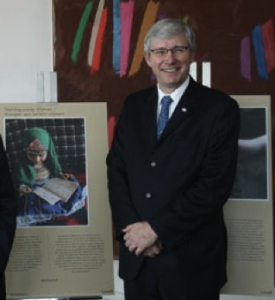Think Big
Posted on 10. Oct, 2010 by joannadafoe in Canada | View Comments
The Tianjin talks have wrapped to a close and some general progress has been made with the negotiating text. The negotiating text for the LCA (non-Kyoto Protocol track) can be found here. Some support for legal-based language in this track shows potential for progress towards Cancun.
The text for the KP can be found here and lays the groundwork (or shall we say the building rough sketch) for a second commitment period of the Kyoto Protocol. [Ah for Canada... whatever will we do when our first commitment period obligations go spilling into the second?] A lot of negotiations were held behind closed doors, although this apparently is the norm at the UNFCCC.
On the homefront, during the final few days of negotiations a Government supported project was launched entitled Climate Prosperity. The report is authored by the National Roundtable on the Economy and the Environment and aims “to provide insight for Canadians and policy advice to governments on both the economic risks and the economic opportunities for Canada associated with a warming planet… This is not just about coping with climate change, but prospering through it.” The website uses quite a hopeful narrative around the opportunities with climate change. Many leaders in the environment community have flagged concerns with this report and the optimism it evokes.
Diagnosing and observing climate policy is always a fascinating reflection of the human values behind it. Over these years at the UNFCCC, I’ve started to reflect on how we speak about climate change and I’d like to wrap-up my Tianjin reports on this note.
A Language Older Than Words
Maybe it’s because we just wrapped up the 10/10/10 350.org Global Work Day, but I’m struck by the lack of reverence in UNFCCC plenary. States will promote their self-interest, they will invent loopholes and build strategic allies, they will put chapeaus, footnotes, and brackets on text; but they do not reflect a sense of wonder and awe for life on the planet.
I had this wishful goal last year of building a planetarium in the Bella Centre in Copenhagen. Then I would assign a mandatory planetarium session during the meetings so that delegates review a concentrated history of the cosmos from the Big Bang up until now. Or, perhaps during negotiations if a conflict develops then all Parties will revisit the story of our Universe. Whatever conflicts yield so much stress in negotiations might be viewed, with such perspective, as dramatic - perhaps even childish. Maybe negotiators will laugh at the whole process as risky and misguided. New Zealand on behalf of Annex 1 countries received a Fossil Award on Friday for wielding a harsh ultimatum between forest management rules on their terms or mitigation targets. Where is the respect and reverence in these hardball tactics?
So my parting hope for everyone - citizens, negotiators, and especially my Government - is to keep this perspective when choosing the fate of our home.
Catching up with Guy Saint-Jacques
Posted on 08. Oct, 2010 by joannadafoe in Canada | View Comments

Guy Saint-Jacques
The Tianjin talks have turned out to be a very busy time for negotiators, but between his many meetings we were able to catch up with Canada’s new lead negotiator, Guy Saint-Jacques.
JD: Congratulations on the new position. Working on climate must be quite different from your early job in DC? How does the new role feel?
Guy: I was thrilled to be asked to take on this job and to deal again with climate change issues. It’s a great challenge that I look forward to. I also believe that my experience working and living in countries such as Africa, Mexico and China help me to understand the challenges that developing countries face.
What do you envision a success or failure agreement to look like in Tianjin? How about Cancun?
Guy: Success in Tianjin is about making progress, and striking a balance. The same goes for Cancun. Ultimately we want a comprehensive, legally binding post-2012 agreement that is fair and effective.
In fact, I would consider Tianjin a success if we were able to come out with draft decision texts or at least if we could have reduced the areas of uncertainties. That being said, we still have a lot of work to do before the end of the session and in the lead up to Cancun.
Are there any concrete outcomes that you feel are ambitious, but still feasible, for Cancun?
Guy: Real outcomes are possible. We are hopeful that Cancun will produce positive outcomes on several key issues. Of course, a clear mandate to negotiate a single legally binding agreement that would be based on the Copenhagen Accord would be a great result, and I think that we are making important progress this week that is helping to pave the path forward.
Consensus is building in some key areas, and this could lead to substantive decisions in Cancun. I believe outcomes are possible on REDD+, adaptation, and finance and technology. These are ambitious, but also feasible based on the progress we have made so far this week in Tianjin. However, we will need to make progress on mitigation, MRV and international consultation and analysis (ICA) as well.
So far the negotiations seem focused on general terms, “balanced package” etc – how do you feel about this turn in the negotiations?
Guy: I think it’s important to note that these negotiations take time. It’s not reasonable to expect that we will come to an agreement right away. However, because of the urgency of coming up with solutions to the problem of climate change, it will be important for some countries to start to make concessions and be less obstructionist.
Our goal is to reach a balanced package that would involve aspects that are important for developing countries but also that would ensure all major emitters agree to take on reduction commitments that take into account national circumstances and capabilities.
Canada made an exciting announcement about its share of fast-track climate financing on Friday. Does clean energy in this announcement mean renewable energy and energy efficiency, or something else?
Guy: Our fast start financing announcement is totally aligned with commitments in the Copenhagen Accord to provide funding to the poorest and most vulnerable countries in the world. For instance, we are giving $20 million to the Least Developed Countries Fund, and $15 million in bilateral assistance ($5 million to Haiti, $7 million to Ethiopia, and $3 million to Vietnam.) Also, our $285.7 million in contributions to the IFC will support clean energy projects in developing countries. We already received very favourable feedback to the $5.8 million dollars grant financing to support IFC’s advisory services – this will help remove barriers to private investment in energy efficiency and renewable energy projects. So, obviously clean energy includes both renewable energy and energy efficiency.
Our announcement that we will invest $400 million for international climate change efforts this fiscal year is an important milestone. This is Canada’s largest ever contribution to support international efforts to address climate change. When you look at where we were last year, we have come a long way. In the span of a year, we signed the Copenhagen Accord, which committed us to jointly provide fast-start financing, and Canada committed new, additional and substantial funding for climate change.
We have a strong readership of Canadians back home who also want to show support for your role in Tianjin. What is the best way we can help you advance Canada’s goals?
I’m glad to hear that you have many readers interested in this subject. In fact, I would hope that more Canadians follow the issue and learn about how complex the negotiation process is.
We are very lucky to have a strong, dedicated team of negotiators who are working constructively at the negotiations. I think it’s important to understand that we are making progress. We need the support of all Canadians.
If any of your readers would like to know about what they do personally to reduce their carbon footprint, I would encourage them to visit our website.
Any final words for the readers back home?
I think it’s important to note that Canada is in fact taking real action to reduce emissions on both the national and international landscapes. As you know, we signed the Copenhagen Accord, and committed to reduce emissions by 17 per cent below 2005 levels by 2020.
At home, we are pursuing work on a sector by sector basis. We recently published final regulations for vehicle tailpipe emissions that are aligned with those of the U.S, and we will work to do the same for heavy-duty vehicles. We are also following through on our commitment to regulate renewable content in the fuel supply, and to regulate coal-fired electricity generation which will help reduce greenhouse gas emissions, and improve air quality for all Canadians.
For my part, I certainly intend to work as constructively as possible to try to reach a legally binding agreement that would help us to address global climate change.
Thursday Update
Posted on 07. Oct, 2010 by joannadafoe in Canada, bits | View Comments
Over in Tianjin, the negotiations are splintering into small and informal contact groups. This makes it hard for us to track the interaction among state delegates (not to mention when you add a livestream to the picture). Tomorrow I am hoping to connect with Mr. Saint-Jacques, so stay tuned for an update on that end.










